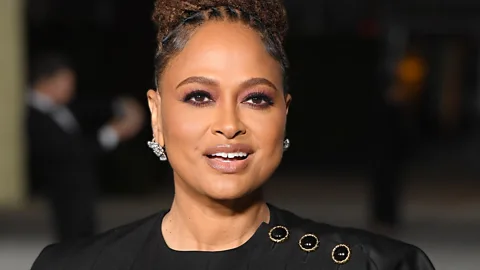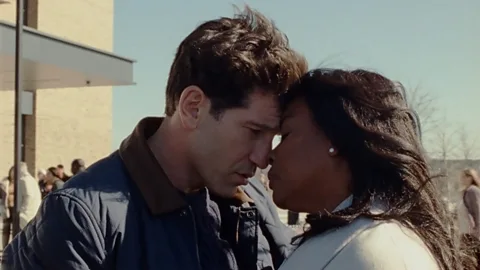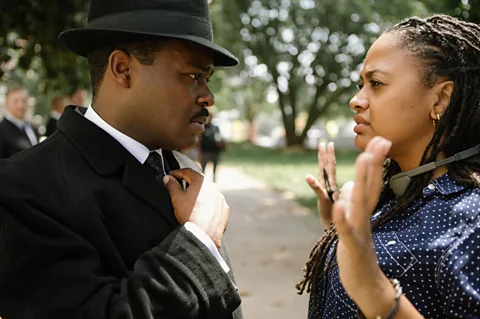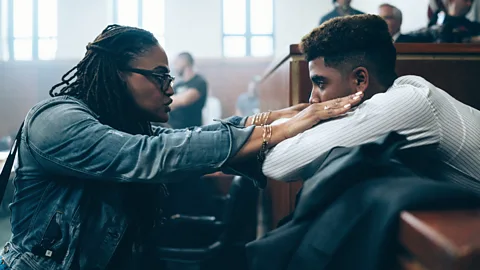By Hanna FlintFeatures correspondent

 Getty Images
Getty Images
The celebrated US director speaks about her latest release Origin, and its extraordinarily ambitious, emotional exploration of how racism and prejudice has thrived around the world through history.
When Oprah Winfrey encouraged Bafta and Golden Globe-winning US director Ava DuVernay to read Isabel Wilkerson’s Caste: The Origin of Our Discontents, she wasn’t in the right “space”. It was during the pandemic and George Floyd had been murdered just a couple of months earlier, so the idea of diving into a near-500-page book deconstructing the societal pillars of systemic prejudice and discrimination was a daunting prospect. But when DuVernay finally sat down to read the Pulitzer Prize-winning author’s revolutionary work of nonfiction, “I felt activated by it,” she tells BBC Culture.
More like this:
DuVernay is well-versed in the subject matter of racial inequality. She’s earned global acclaim across film and TV for her Martin Luther King biopic Selma, the prison-industrial-complex documentary 13th and Netflix series When They See Us, about the “Central Park Five” miscarriage of justice that saw five black and Latino teens wrongly convicted for the rape and assault of a female jogger.

 Neon
Neon
Wilkerson’s 2020 book, however, offers a somewhat radical interpretation of the prejudices in the US that goes well beyond racial lines. Instead, she presents parallels between the US’s socioeconomic hierarchy (from colonial America to the Jim Crow South through to today), Nazi Germany and the caste system in India, to argue that the social construct of caste – the system of dividing society by class or group based on social, cultural, ethnic and/or hereditary factors – has been an invisible and insidious influence on global societies for centuries. On the first reading, the director didn’t quite understand or agree with every part of the book but she was thoroughly engaged. “So I read it again and as I started to go deeper into this anthropological thesis, and really understand the repercussions of what I was learning, I became very arrested and wanted to share it,” she explains.
Four years later, the result is an expansive, emotionally potent drama grappling with the weighty themes and ideas that Wilkerson’s writing explores, as well as the writer’s journey itself. Where the academic book blends philosophy, sociology, theology and historical fact with anecdotal evidence, DuVernay expands the more personal stories of humanity on screen. She does this both through flashback sequences to historical figures mentioned, such as the real-life couple August Landmesser and Irma Eckler, a German man and a German-Jewish woman who married during World War Two – “I was interested in how to extend Isabel’s explanations through the development of the human stories that she introduces” – and by making the author the film’s protagonist too.
With Wilkerson stunningly portrayed by Academy Award-nominated actor Aunjanue Ellis-Taylor, DuVernay tracks her “intellectual quest” around the world – her exploration of the social ills that led to to the 2012 killing of African American teen Trayvon Martin catalysing her wider investigation – as the writer discovers uncomfortable truths and banal horrors during trips to Berlin, New Delhi and back home. All the while, Isabel is processing unfathomable personal grief; tragically, the journalist and academic not only suffered the loss of her husband Brett Kelly Hamilton in 2015, but her mother a year later and her cousin too. “She was gracious enough to tell me those stories about her loved ones, her love stories with them, and how their passing affected her,” says DuVernay of the 15 months of conversations on video calls she had with Wilkerson. “It was a beautiful gift that she gave the movie.”
It would be easy to compare this sort of globe-spanning writing endeavour by a female writer to Elizabeth Gilbert’s bestselling travelogue-turned-film Eat Pray Love – Origin might be more “Grieve, Discover, Write” with far more narrative probing and cinematic flair – but DuVernay bristles at the comparison. “We have a whole subcategory of male geniuses moving around the world to solve big problems and journey through their intellectual curiosity, and those are regarded as their own work and have great weight,” says DuVernay. “Where we are is images of a woman alone in the world, thinking, feeling, are reduced to the very few cinematic comparisons of it that we have, which is unfortunate.”
Violence gets into a dangerous space when it’s rendered in cinema as spectacle that is divorced from dignity – Ava DuVernay
What DuVernay wants viewers to see is a vast gallery of images that capture the beauty and humanity of people who have gone through both great joy and pain, without shying away from the traumatic and violent acts that caste prejudice has inflicted on the world – from a reenactment of the night of Trayvon Martin’s murder to the harrowing capture of August Landmesser and Irma Eckler by Nazis and the barbaric enslavement of Africans on European slave ships bound for America. “When I address [violence] in my storytelling, it is to bear witness, it is to share what the obstacles are on the way to triumph – you need to know what’s being survived,” DuVernay says. “It gets into a dangerous space when it’s rendered in cinema as spectacle that is divorced from dignity.” But she does struggle with the line of questioning about the film’s portrayal of violence. “I went back just for kicks and looked at interviews with the director of John Wick, interviews with the director of Killers of the Flower Moon, interviews with others, where the depiction of violence is not brought up hardly ever,” she explains. “That question, I get it often, in contrast to the absence of those questions with films that are steeped in violence for no reason.”

 Alamy
Alamy
DuVernay felt liberated to put together a cast who could bring dignity to the real-life characters they were playing. Joining Ellis-Taylor in the ensemble are Jon Bernthal, Emily Yancy and Niecy Nash-Betts as Isabel’s husband Brett, mother Rubye and cousin Marion, respectively, alongside Finn Wittrock, Victoria Pedretti, Jasmine Cephas Jones, Isha Blaaker, Vera Farmiga and Nick Offerman. This line-up, she says, “regardless of any other analysis for commercialisation”, was only possible after parting ways with long-time collaborator Netflix and choosing to make the movie independently. “There were no considerations of who had what social media, how many followers this person had, or their scores on the last [audience] test. It was based on who I felt was best for the part, which was a real joy and a privilege that comes from being able to make a film without corporate interference.”
Mind and soul
Origin can be a demanding film but one that very much hinges on the ability of its lead to invite viewers into Isabel’s world. Ellis-Taylor, who was Oscar-nominated for King Richard, succeeds by offering a subtle yet utterly compelling performance, laced with pathos, of a woman excavating her mind and soul in the diligent pursuit of knowledge. Described by DuVernay as a “deep diver”, the actor, who was nominated for an Emmy for her lead role in When They See Us, “fully immersed herself in research [and the] analysis of every line, every scene, every gesture”. It was “the most intellectually rigorous” collaboration DuVernay has experienced with an actor, which is why the near-absence of Ellis-Taylor’s name in awards season conversation has been frustrating. “I feel emotional,” she says. “I felt the same way about David Oyelowo. They worked so hard, day in and day out, you want them to have the moments of grandeur.”
The life of these films goes far beyond the glittery times, and that’s the honour of being a filmmaker – Ava DuVernay
Oyelowo, who played Martin Luther King in DuVernay’s Selma, was frozen out at the 2015 Oscars, alongside his director, despite them both receiving significant acclaim and the film picking up a best picture nomination. Oyelowo believed they were snubbed by voters for protesting police brutality in relation to the police murder of Eric Garner. Origin premiered at 2023’s Venice International Film Festival and has received mostly positive reviews but there’s been a muted response from awards voters and pundits and Ellis-Taylor was overlooked at this year’s Golden Globes. Instead of attending, she was filmed on the same day by a member of the public promoting Origin by handing out flyers for the film at a cinema chain in Los Angeles.
DuVernay, who reposted the video with an impassioned caption in praise of Ellis-Taylor, says: “My post was really about feeling so emotional that on this day, this woman who’s such a great actor, instead of wallowing she got out there, took her postcards and promoted a movie. It made my heart ache that she wasn’t in the fancy dress that day [but] I know from experience with 13th, with When They See Us, with Selma, that the life of these films goes far beyond the glittery times, and that’s the honour of being a filmmaker.”
There’s still hope that Origin might garner some Oscar love; Angelina Jolie reached out to DuVernay to offer her support and host two awards screenings, while Cher and Ben Affleck have also joined the grassroots campaign. But beyond gold statues, the film has arrived at a pertinent time in our collective history. Civil wars in Sudan and Myanmar continue to see the mass deaths and displacement of its civilians. The International Court of Justice (ICJ) is currently considering a case brought by South Africa as to whether Israel is committing genocide against the Palestinians in Gaza, with Israel strongly rejecting the allegation, while last November the UN’s High Commissioner for Human Rights Volker Türk stated the Middle East conflict is “driving more polarisation and creating deeper fractures, with terrible impact on the solutions that humanity so urgently needs”.

 Netflix
Netflix
The US and UK’s support of the Israeli government has not gone without backlash heading into an election year, while cases of antisemitism and Islamophobia are rising at an alarming rate in both countries, and around the world. Societal fissures are being keenly felt but DuVernay believes “there’s no difference between this moment and any other moment in [the US] as it relates to the tensions between people, the divisions that we try to ignore and sweep under the rug.”
“It’s a global challenge that we face, but certainly, the United States has perfected many parts of it, and I think it’s just about individuals interrogating where they are raising their voices,” she adds. “The more of us that do that, the more the arc of the universe will tilt a little bit more towards justice, as Dr King said much better than I did.”
So, could a film like Origin inspire such a movement towards collective justice and empathy? DuVernay is not one to overestimate the power of her cinematic contributions, but she’s glad to be offering something: “This is just a film, it’s just two hours to sit in the dark or to sit at home and be reminded of some key things that might unite us instead of divide us.”
Origin is out now in US cinemas and will be released in UK cinemas on 9 February.
If you liked this story, sign up for The Essential List newsletter – a handpicked selection of features, videos and can’t-miss news delivered to your inbox every Friday.
If you would like to comment on this story or anything else you have seen on BBC Culture, head over to our Facebook page or message us on Twitter.





